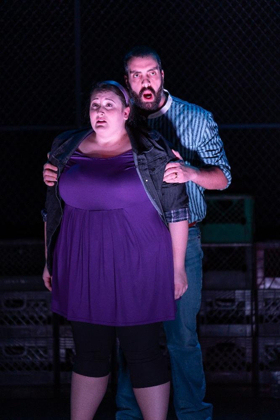Review: World Premiere One-Hour Opera TAKING UP SERPENTS at The Kennedy Center

Before the Washington National Opera continues its season of what artistic director Francesca Zambello calls "dead composers," she was excited Friday to present the first of this year's batch of newly commissioned operas by young American composers and librettists.
In seven seasons, its American Opera Initiative Festival has been one of the leading incubators of works of new and living American artists, infusing opera with new and immediate stories backed by bold new musical approaches.
By picking creators of one new hour-long opera and three new 20-minute works each year, the festival has had proven success in boosting the careers of new composers. After Missy Mazzoli, who presented her one-hour premiere "Proving Up" last year, it was produced by two other companies and she has been commissioned to write a new work for the Met.
Like the topical, thoroughly American subjects of the 20 minute operas this year (women's health care, drug addiction, rescue dogs), this year's one-hour world premiere, "Talking Up Serpents," by Kamala Sankaram (music) and Jerre Dye (libretto), takes up the distinctly American practice of religious snake handlers.
As presented at the Kennedy Center Terrace Theatre Friday, it features Kayla, an employee at a Save Mart in Gulf Shores, Ala., who escaped her restrictive religious family life until she gets a call from her mother that her dad has been hospitalized after being bitten by a 4-foot timber rattler during a service.
Returning to Appalachia on an all night bus conjures up all kinds of memories for her, growing up with her dad and being taught to be fearless. For the family, facing danger was a way to show Satan how tough they were, though they also shot firecrackers into the heavens as a way to shake their fist at God.
Having just an hour to tell the tale means things move fast, but the work begins with Alexandria Shiner's standout Kayla musing about the pointlessness of moths in the parking lot of the Save Mart, flying blindly into the light - Dye's metaphor for the religious fervor to soon be explored.
It may be a shock to hear the strong soprano of Shiner in such low-grade surroundings (among employees who use language so strong there are printed warnings about adult material and the supertitles just won't repeat them).
There are some bold ways of mixing worlds, though. Who knew, for example, that speaking in tongues would work so well in an operatic idiom? Tougher was Sankaram's efforts to incorporate shape note singing of Appalachia into the trained world of operatic singing.
Her orchestrations, performed by a fully game Washington National Orchestra under the direction of Lidiya Yankovskaya in her WNO debut, emphasize the unease of Kayla's reluctant return home to her estranged family.
The orchestra not only creates unusual noises with bassoons minus the mouthpieces, but there is also what may be the first use in opera of the children's toy called the whirly tube, those ribbed plastic hoses that emit an otherworldly sound when swung around.
In a genius move of director Alison Moritz's spare production is that the tubes also double as snakes from the pit, when the young Kayla goes serpent hunting with her dad, a bonding experience gone wrong.
Timothy J. Bruno as the preacher man father is another standout in the small cast, with a bass as overpowering as his size, looming menacingly over the rest of the cast. But mezzo-soprano Eliza Bonet's character has one of the most existential problems - defying her religion and her husband simply by taking him to the hospital to save him after the bite.
The opera could use a little more time to let the clashes of testimony and time settle, but compacting the drama into 60 minutes only helps intensify the experience.
Think of how much tougher it would be for the 20-minute world premieres, which were to debut the following day.
In those, Matt Boehler (music) and Laura Barati (libretto) focus on a pregnant 16-year-old and her family, faced with a decision when the nearest women's health clinic is halfway across Pennsylvania in "75 Miles."
Then "Relapse" by Molly Joyce (music) and James Kennedy (libretto) deals with the aftermath of a serious drug overdose.
Finally, "Pepito" by Nicolas Lee Benavides (music) and Marella Martin Koch (libretto) concerns with a rescue dog adopted by young married professionals who have their own problems.
Those premieres had to contend with two performances on the night of a snowstorm; "Taking Up Serpents" was performed just twice, concluding with a matinee Sunday.
But if the past is an indicator, there's a very good chance that other, more fully developed versions of each work is likely to emerge in the future through other companies, one of the vanguards of the remarkable festival.
Photo credit: Alexandria Shiner and Timothy J. Bruno. Photo by Scott Suchman.
"Taking Up Serpents" was presented at the Kennedy Center in the American Opera Initiative Festival Jan. 11 and 13. Information online.
Reader Reviews

Videos

